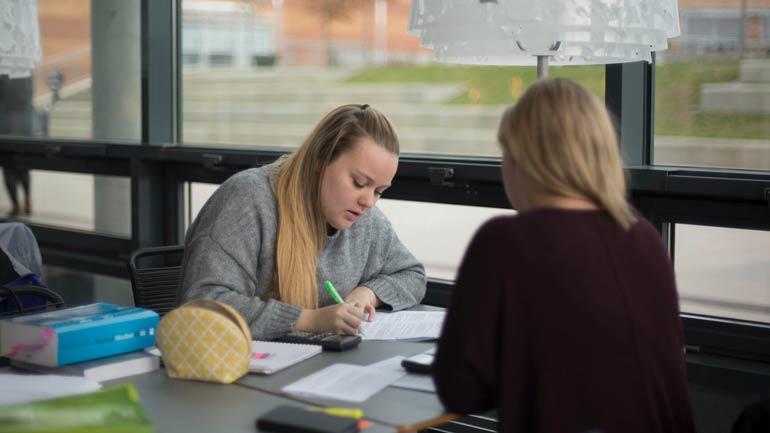The municipalities have changed their infection tracking procedures. They are required to prioritise the administration of vaccines to as many people as possible and have been given greater freedom to adjust infection tracking work in relation to available capacity. Our host municipalities have chosen slightly different approaches, which also affects infection tracking efforts at USN.
What rules are applicable to me?
National health authorities and the USN are encouraging everyone to get the vaccine. The vaccine provides the best possible protection against serious illness.
If you are unwell, do not attend campus, but stay home until you are well again. This applies even if you have been fully vaccinated and have had a negative PCR test. The distancing rule applies on campus, with the exception of teaching situations. Follow the excellent procedures that have been incorporated for hand hygiene.
Infection tracking in the event of positive cases on campus
When we receive information from a municipality about an infected student or employee having been on campus, we will assist with the municipality’s infection tracking efforts. On other occasions, a student may notify us themselves. In such cases, the emergency preparedness management team must consider whether it is necessary to take action.
The chief municipal medical officer may require students who have been exposed to a risk of infection to quarantine if they do not have protection, i.e. if they are not fully vaccinated or have tested positive for COVID-19 within the last 12 months. The municipality may also decide that students do not have to quarantine by requiring them to follow a testing regime instead. Students are responsible for following up on this themselves.
When the emergency preparedness team is informed of positive cases, the programme coordinator and head of department will be informed. The programme coordinator is responsible for informing teachers or others who have been in contact with the student(s) in question.
If decisions that affect all or large parts of the campus are taken, all campus employees will be informed via e-mail. Information will also be published on the Intranet and at www.usn.no/korona
If a student who lives in shared accommodation tests positive, the student in question should be isolated from their housemates. SSN makes great efforts to find alternative housing and will also ensure that students in isolation get food and other necessary help. The municipality also has a responsibility to offer alternative housing and many municipalities have agreements in place with local hotels.
Why is there no list of positive cases?
An updated list of all known positive cases that the emergency preparedness management team was aware of was published in spring. This is no longer done. Since the municipalities follow different infection tracking procedures, there is now greater uncertainty as to whether we are aware of all positive cases.
High threshold for digital teaching
In August, there was a large COVID-19 outbreak in Ringerike, with a large proportion of students among those who tested positive. On the recommendation of the chief municipal medical officer, the entire Ringerike campus switched to digital teaching for two weeks. In Vestfold, a group of around 80 students switched to digital teaching for a few days, a decision that was made by USN.
“We now have a high threshold for switching to digital teaching. The national authorities have given clear indications of wanting universities to remain open. However, we will always listen to the advice from the health authorities in our host municipalities,” says Gro Bratsberg, Director of Infrastructure and Head of Emergency Preparedness.
Rapid or self-testing on campus
Rapid testing or self-testing is or has been offered at all campuses in slightly different periods and to varying extents. This is an offer we provide together with the host municipalities and depends on the municipalities wanting to prioritise the capacity to test on campus.
“It would be nice to be able to offer rapid testing or selftesting at all campuses, but the availability of tests that students can administer themselves and the availability of the necessary healthcare professionals to administer rapid testing is not sufficient for us to continuously provide these services at all campuses. We are now considering how to establish a scheme for distributing self-testing kits on a more permanent basis,” says Bratsberg.
Rapid testing and other testing are available to students. The USN cannot require students to be tested or to show a COVID-19 certificate or negative test result in order to participate in lectures or other activities.
